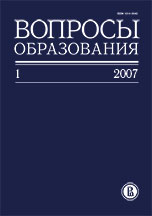Наиболее читаемые статьи этого автора (авторов)
- Татьяна Абанкина, Отношение студентов экспериментальных вузов к ГИФО , Вопросы образования / Educational Studies Moscow: № 2 (2005)
- Татьяна Абанкина, Модели интеграции и кооперации образовательных ресурсов в сельском социуме , Вопросы образования / Educational Studies Moscow: № 3 (2008)
- Татьяна Абанкина, Развитие сети общеобразовательных учреждений в регионах: результаты реализации приоритетного национального проекта «Образование» в 2007–2008 гг. , Вопросы образования / Educational Studies Moscow: № 2 (2009)
- Ирина Абанкина, Татьяна Абанкина, Людмила Филатова, Елена Николаенко, Тенденции изменения общественного спроса на высшее образование в современной России , Вопросы образования / Educational Studies Moscow: № 3 (2012)
- Татьяна Абанкина, Анна Красилова, Гордей Ястребов, Образование как старт для жизни: жизненные планы сельских школьников в России , Вопросы образования / Educational Studies Moscow: № 2 (2012)
- Татьяна Абанкина, Василий Гнедовский, Управленческие практики капитализации культурного наследия в креативной экономике , Вопросы государственного и муниципального управления: № 3 (2017)
- Татьяна Абанкина, Павел Деркачев, Стратегии повышения эффективности использования объектов культурного наследия , Вопросы государственного и муниципального управления: № 4 (2016)








